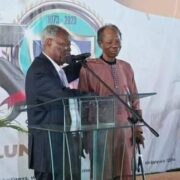Wike, Umahi, other minister designates to get N1.37bn for accommodation
The housing allowances for the newly appointed ministers may cost Nigeria about N343.25m annually, a new finding has revealed.
With that annual allocation, in four years, the federal government is expected to spend N1.37bn on the 45 minister-designate’s accommodation, the Punch reports.
Politics Nigeria gathered that the new ministers’ allowances are based on data collated from a document obtained from the website of the Revenue Mobilisation and Fiscal Allocation Commission.
It covers allowances for accommodation (200 per cent of basic salary), domestic staff (75 per cent of basic salary), utilities (30 per cent of basic salary), and furniture (300 per cent of basic salary).
Unlike other allowances paid monthly, furniture allowance is usually paid once in four years.
Politics Nigeria reported that President Bola Tinubu recently unveiled the portfolios of his ministers.
In the list obtained, it was observed that 13 of the nominees were appointed Ministers of State while some new ministries were also created.
The ministers and their designations are as follows Minister of Communications, Innovation, and Digital Economy: Bosun Tijani; Minister of State, Environment and Ecological Management: Ishak Salako; Minister of Finance and Coordinating Minister of the Economy: Wale Edun; Minister of Marine and Blue Economy: Bunmi Tunji-Ojo; Minister of Power: Adebayo Adelabu; Minister of State, Health and Social Welfare: Tunji Alausa; Minister of Solid Minerals Development: Dele Alake; Minister of Tourism: Lola Ade-John; Minister of Transportation: Adegboyega Oyetola.
Others are Minister of Industry, Trade and Investment, Doris Anite; Minister of Innovation Science and Technology, Uche Nnaji; Minister of State, Labour and Employment, Nkiruka Onyejeocha; Minister of Women Affairs, Uju Kennedy; Minister of Works, David Umahi; Minister of Aviation and Aerospace Development, Festus Keyamo; Minister of Youth, Abubakar Momoh; Minister of Humanitarian Affairs and Poverty Alleviation, Betta Edu; Minister of State, Gas Resources, Ekperikpe Ekpo; Minister of State, Petroleum Resources, Heineken Lokpobiri; Minister of Sports Development, John Enoh and Minister of Federal Capital Territory, Nyesom Wike.
Also on the list are the Minister of Arts, Culture and Creative Economy, Hannatu Musawa; Minister of Defence, Muhammed Badaru; Minister of State Defence, Bello Matawalle; Minister of State, Education, Tanko Sununu; Minister of Housing and Urban Development, Ahmed Dangiwa
President Tinubu set the record for the highest number of ministerial nominees in Nigeria’s Fourth Republic (1999 to date) with 48, which experts said would likely worsen the high governance costs.
The President’s nominees topped the 42 appointed by the immediate past president, Muhammadu Buhari, in 2019 by five more persons.
Buhari named 36 ministers in his first term, while the number increased to 42 during his second term.
Former President Goodluck Jonathan in 2011 named 33 nominees to be ministers in his cabinet, including nine from the Umar Yar’Adua administration.
In 2007, Yar’Adua named a 39-member cabinet comprising 32 men and seven women.
Former President Olusegun Obasanjo initially named 42 ministers in 1999 but reviewed his cabinet to reduce the number of ministries and ministers to 27 and 40, respectively, before he left office in 2007.
Despite calls to reduce the cost of governance, Tinubu has now surpassed Obasanjo, Yar’Adua, Jonathan and Buhari to nominate 48 would-be ministers, setting a new record since the country returned to democracy 24 years ago.
However, with the three yet to be approved, the total number of ministers has dropped to 45, which still exceeds previous administrations.
According to Saturday Punch, each minister is entitled to an accommodation allowance of N4.05m, a domestic staff allowance of N1.52m, and a utility allowance of N0.61, alongside a furniture allowance of N6.08m, which is paid once in four years.
Each minister of state is entitled to an accommodation allowance of N3.92m, domestic staff allowance of N1.47m, and utility allowance of N0.59, alongside furniture allowance of N5.87m, which is paid once in four years.
Breaking down the figures, each minister is expected to be paid a total of N7.7m annually while each minister of state is expected to get a total of N7.45m annually.
In four years, each minister gets N30.8m while each minister of state gets N29.8m.
In total, the 32 ministers will cost the country about N985.6m while the 13 ministers of state will gulp about N387.4m in four years.
This further means that the 45 ministers would cost the country a total of N1.37bn in four years.




